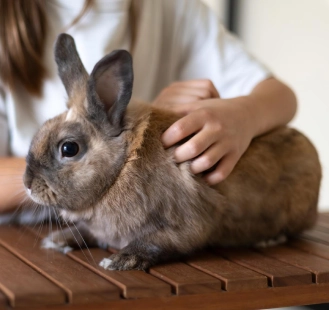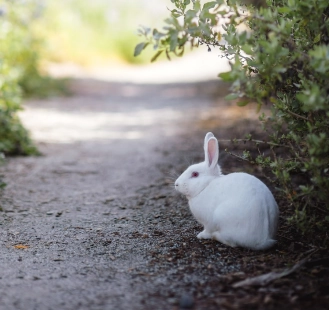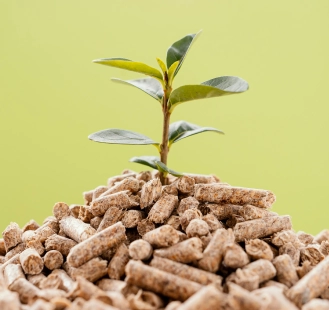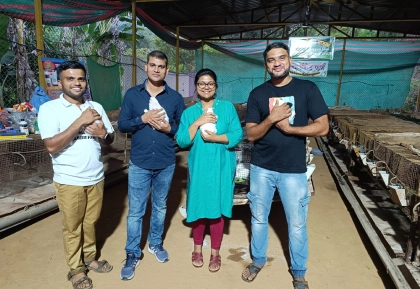Small space, big returns
About Rabbit Farming
About Rabbit Farming
Start Smart with Rabbit Farming – The Future of Profitable, Low-Investment Farming
Rabbit farming, or cuniculture, is a fast-growing, sustainable form of animal husbandry that offers high returns with minimal investment. With their ability to breed quickly, require less space, and consume low-cost feed, rabbits are ideal for small-scale farmers, startups, and rural entrepreneurs. Their lean, protein-rich meat is increasingly in demand for its health benefits, while their manure enhances soil fertility, making this model both profitable and eco-friendly.
Beyond income, rabbit farming supports food security, rural employment, and women/youth empowerment – making it a smart, scalable solution for a greener and more self-reliant future.

01
Nutritious Meat. Growing Demand.
Rabbit meat is a lean, protein-rich alternative that’s low in fat and cholesterol, making it one of the healthiest meats available. Its digestibility and high nutritional value have made it increasingly popular among health-conscious consumers and meat lovers alike.
Demand is especially high in regions of Maharashtra, Goa, and parts of South India, where rabbit meat is part of local cuisine. As this demand continues to rise, rabbit farming presents a sustainable and profitable opportunity for farmers and meat producers.

02
Premium Fur & Wool
Rabbit fur is valued for its softness, warmth, and versatility, especially from breeds like Angora, Chinchilla, and Rex. Angora rabbits are famous for their wool, which is spun into fine, luxurious yarn, while Rex and Chinchilla breeds offer dense, velvety fur used in garments and accessories.
This makes rabbit farming not just a source of meat, but also a gateway to the textile and fashion industry. With proper care and ethical harvesting, fur and wool production can become a profitable and eco-friendly addition to any rabbit farming venture.

03
High-Demand Breeding Stock
Breeding rabbits is a reliable source of income, especially with the rising demand across rural and semi-urban areas where rabbit farming is rapidly expanding. Quality breeding stock is essential for setting up new farms and maintaining healthy bloodlines.
With increasing interest from aspiring farmers and pet owners alike, selling breeding pairs or trios has become a profitable venture, fueling the growth of rabbit farming communities across Maharashtra and beyond.

04
Adorable Companions. Rising Pet Demand.
Fancy and small rabbit breeds are becoming increasingly popular as household pets, especially in urban areas. Their gentle nature, low maintenance needs, and cute appearance make them ideal companions for families and children. As awareness grows, so does the demand—creating a niche yet profitable market for breeders focused on pet-quality rabbits.

05
Natural Fertilizer. Gardeners’ Gold.
Rabbit manure is a powerful organic fertilizer, naturally rich in nitrogen, phosphorus, and potassium—essential nutrients for plant growth. Unlike many other manures, it doesn’t need composting before use, making it a convenient and eco-friendly option for farmers and gardeners. Its rising demand among organic growers adds extra value to rabbit farming beyond meat or fur.
Key Features
Smart, Scalable & Sustainable: The Key Advantages of Rabbit Farming
Rabbit farming, also known as cuniculture, is an efficient and rewarding venture that involves raising rabbits for meat, fur, wool, and as pets. With a low initial investment, rabbits reproduce quickly, grow fast, and require minimal space making them ideal for small-scale or backyard setups.
Low initial investment
Space-efficient and scalable
Small-scale and backyard farming
Rapid reproduction and growth
About Rabbit Farming
A Smart, Profitable, and Sustainable Livestock Option
High Reproductive Rate
Rabbits are prolific breeders. A single doe can produce 6–8 litters per year, resulting in 40–60 kits annually, offering a fast return on investment and steady production.
Fast Growth & Early Maturity
Rabbits reach market weight (2–2.5 kg) within just 2–3 months and become reproductively active by 5–6 months, ensuring quick turnover and scalability.
Low Investment, High Returns
Rabbit farming requires minimal space and basic infrastructure. With low-cost feeding options like green fodder, pellets, and even kitchen waste, it’s an affordable venture with high profit potential.
Nutritious Meat
Rabbit meat is a lean source of protein, low in fat and cholesterol. It’s increasingly preferred by health-conscious consumers and is making its way into gourmet markets.
Organic Fertilizer
Rabbit manure is rich in essential nutrients like nitrogen, phosphorus, and potassium. It can be used directly on crops, making it an excellent natural fertilizer for farms and home gardens.
Employment Opportunities
Rabbit farming creates jobs in rural areas and has expansion potential into breeding centers, meat processing units, agro-tourism, and wool-based industries.
About Rabbit Farming
Know Your Breeds: From Wild Hares to Domestic Champions
Rabbit farming involves both wild and domestic types, with domestic breeds specially developed for meat, fur, wool, or pets. These rabbits are chosen for their rapid growth, reproductive efficiency, and adaptability—making them ideal for commercial and backyard farming. Wild rabbits like hares, on the other hand, are not typically suited for farming.

